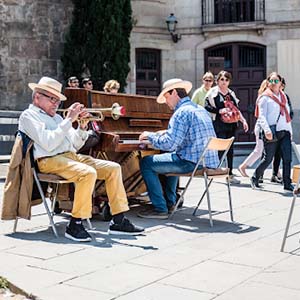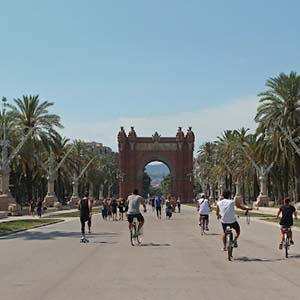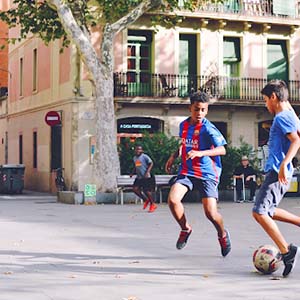Moving to Barcelona
Barcelona is Spain’s second-largest city with a rich history dating back to 680 years BC. It is also the capital of Catalonia and Spain’s business hub, home to over 1.6 million residents. Like the rest of Spain, it is 1 hour ahead of the UK and has a pleasant Mediterranean climate. Keep in mind that unlike the rest of Spain, Barcelona is considered the capital of Catalonia and as a result, the first language of the region is Catalan, which is slightly different to Spanish.
Can I Move to Barcelona?
You can move to Barcelona from outside of the EU, but you will need to apply for a long-term visa, known as a Visado Nacionale. The practice is the same throughout Spain and it also applies to anyone staying for longer than three months. If you have a second home in Spain but no right to residency, then you will need to apply for this visa.

Getting around Barcelona
If travelling short distances, walking is incredibly enjoyable in Barcelona. The city’s warm weather, beautiful architecture and great paths will make it a pleasure to get from one place to another on foot. Alternatively, cycling in Barcelona is incredibly safe and a great way to stay fit when commuting. There is a popular bike-sharing service called Bicing which allows you to rent bikes and drop them off at another location.
Public Transportation
Barcelona is a bustling city with great public transport connections. There is the Aerobus service offering buses which run every 10-15 minutes, RENFE train, Barcelona’s Metro, Six Tramlines and Taxi services. What makes public transport incredibly convenient in Barcelona is the fare system – one fare can be used on subways, buses, trams, and commuter trains if the journey lasts less than one hour and 15 minutes.
Driving
Driving is not an ideal way to get around Barcelona, so we suggest that expats reconsider purchasing a car when living and working in Barcelona. This is due to limited parking spaces and extremely high rates of private garages. The narrow roads are also a recipe for disaster, with most local cars having scrapes and bumps – definitely not a place to purchase a new, shiny car. If you will be, however, living in Barcelona and commuting to another town for work, owning a car might be an option, however definitely not a necessity. For those weekend or shopping trips, Barcelona has a convenient car-sharing service called Avancar where you can rent a car online and pick it up from a nearby location.
Driving
Driving is not an ideal way to get around Barcelona, so we suggest that expats reconsider purchasing a car when living and working in Barcelona. This is due to limited parking spaces and extremely high rates of private garages. The narrow roads are also a recipe for disaster, with most local cars having scrapes and bumps – definitely not a place to purchase a new, shiny car. If you will be, however, living in Barcelona and commuting to another town for work, owning a car might be an option, however definitely not a necessity. For those weekend or shopping trips, Barcelona has a convenient car-sharing service called Avancar where you can rent a car online and pick it up from a nearby location.
Everyday shopping
You will be able to find household supplies and any other equipment locally. However, some of your favourite brands might not be available in Spain. It might be wise to bring a small stash of your favourite branded items until you grow to like Spanish alternatives. Head over to La Rambla for boutiques, tapas bars, and kiosks.
For clothes, you will be able to shop in many shopping centres and boutiques around Barcelona, with the majority of stores open until 8pm. Head over to Passeig de Gracia for luxury shopping. Once a week, there is also a market where the streets get closed off and people can search for bargains – known in Spain as “compras.” Encants Barcelona is a flea market that is open most weekdays, and a great place to look for “compras.”

Entertainment and dining
Moving to a new country requires adjustment – including knowing places to go on the weekends! Visit EuroResidentes or OpenTable for eating out locations and TimeOut for entertainment suggestions. This will be a great way to experience Spanish Tapas and immerse yourself in the Spanish culture in Barcelona.

The Expatriate Community
There are over 300,000 expats that currently live in Barcelona. Meet fellow expats at various local clubs and organizations, such as the British Council, Barcelona Women’s Network or the American Society. Alternatively, go on a local bar crawl and meet fellow Brits and other expats that way.

Understanding the people of Barcelona
Barcelona is the capital of Catalonia, and as result, there are Catalans as well as Spaniards. In general, Spanish people are formal and reserved – they believe that respecting one another is crucial. Always use titles first and do not refer to someone by their first name, until invited to do so. Address men as Señor, Señora to any adult women and Señiorita for younger girls. Two-part last names are a Spanish custom. When referring to someone, use their title and their father’s family name. Handshakes are an expected gesture in both business and social gatherings. All Spaniards stand close to one another – this demonstrates trust and might come as a surprise to Brits who really enjoy their personal space.
Housing
Barcelona is divided into 10 barrios or municipal districts. If you will be working in Barcelona, it is most likely to be in the main business quarters – along Diagonal and Paseo de Gracia streets, in the Eixample area. Aim to live in the west and central parts of town for a convenient commute and nice neighbourhoods.
If you are moving to Barcelona with your family, check out the Bonanova, Tres Torres, Sarria and Pedralbes districts, which have great access to international schools.
Alternatively, opt for suburban areas, just outside of Barcelona. These residential areas tend to have detached and semi-detached homes, popular with expatriates with larger families. They are also only 20 – 45-minutes’ drive to the city centre.
Types of housing
Central Barcelona is primarily a city of apartments, with detached houses difficult to find for rental. L’Eixample offers older apartments, which are extremely elegant but might lack some modern facilities such as swimming pools, parking facilities and new heating systems. Pedralbes neighbourhood has new, large apartments with swimming pools, parking, and other modern facilities.
In Suburban Barcelona, Castelldefels is a great area with cheaper houses, great rail connections and easy to navigate roads. El Maresme is just north of the city centre and also boasts the benefits of the beach – mild weather, sun and sand. After something quieter? Espulges is a residential area just south of Barcelona, with quiet streets and an array of houses. Keep in mind that this area will come at a higher price.

Understanding the people of Barcelona
Barcelona is the capital of Catalonia, and as result, there are Catalans as well as Spaniards. In general, Spanish people are formal and reserved – they believe that respecting one another is crucial. Always use titles first and do not refer to someone by their first name, until invited to do so. Address men as Señor, Señora to any adult women and Señiorita for younger girls. Two-part last names are a Spanish custom. When referring to someone, use their title and their father’s family name. Handshakes are an expected gesture in both business and social gatherings. All Spaniards stand close to one another – this demonstrates trust and might come as a surprise to Brits who really enjoy their personal space.

Interested in information on another country? Take a look at our other International Relocation guides.
Great customer Experiences start here
Very pleasent and helpful. Nothing too much trouble.
Mr M H moved from London, UK to Toronto, Canada
Very helpful and patient even when things got packed that we had to get out again!
Mr M E moved from Enfield, UK to Dorset, UK
Thanks to Graham, Nick and the entire crew!
Mr C D M moved from UK to Singapore
Friendly and helpful crew.
Ms T W moved from USA to Cambridgeshire, UK
